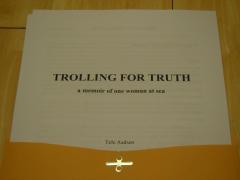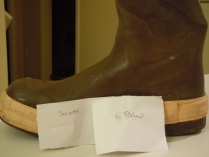I’m writing to you from a ferry. Seated alone on a midday crossing, staring into a muted seascape. Ocean the green of beach glass, clouds shushing the sky; land’s faintest skeleton peeks through sheets of rain. Whitecaps the only bright spots in this world. “Lots of sheep out here today,” one of our fleet elders would say about the turbulent sea.
This relentless gray depresses some, but I embrace it, a reassuring companion for my eternal ambivalence. It’s here in the gray that I struggle to balance a precarious tower of contradiction.
Contradictions like my relationship with guns. On auto-answer, I would’ve told you I don’t have one. You know who I am, sweeties – tree hugging, tofu eating, feminist fisherman and all that. I don’t like guns. I don’t want to shoot shit. I don’t need one to feel safe; they invoke the opposite in me. I don’t want any part of guns or gun culture.
But that’s too black and white for someone living in the gray. Of course I have a relationship with guns. Born and largely raised in a state where over 60% of households have them, how could I not?
Early childhood in Wasilla. My parents – like most Alaskans – hunted. One of our family stories recalled leg cramps hobbling my dad on a caribou trip. My mom packed him, all their gear, and the meat back out.
Being a deckhand. Until recently, most of the boats I crewed on had guns aboard. My mom. Single men. Family boats. Folks who regularly served venison and wouldn’t go to the beach without a gun as bear protection. The single time I’ve fired a gun was on one of those boats, urged to join my shipmates in target shooting a can tossed in the water. Wish I could tell you we retrieved the can afterward.
The August night that my teenaged self paddled to a Sitka Sound island with a handful of other deckhands. We started drinking on the way out, passing the fifth of Jager between kayaks, wasted by dusk. We told fireside stories of the kushtaka, Tlingit lore’s shape-shifting otter-man. Spooked by a shadowy tree, one of the boys pulled a handgun from his backpack. Began waving it around. The rest of us suddenly sober, another grabbed the gun and put it away.
Still a teenager. Midnight cruising the back roads of Washington farmlands. When headlights appeared in the rearview, the jittery driver reached for the glove box. A handgun inside. His paranoia, certain that the car behind was “after us.” Making it home, shaken by what could have been. A year later, learning that boy killed a man.
The land job I had, where shotguns leaned against the truck shop walls, casually propped alongside broomsticks. When the boss’s temper snapped, he’d grab the closest one, stalk outside, and blast starlings off the power lines.
The contrast of people in my heart. I’m on this ferry traveling to a winter reunion with fishing friends. Almost everyone there will be a hunter – including the petite young woman who recently shot her first deer, a four-point – except for Joel and me. I don’t eat meat other than fish because I choose not to eat what I can’t take responsibility for putting on my plate. I don’t like killing fish, but I do it as humanely as possible, with gratitude and respect. Most of these hunters share those values. They talk of “bad kills” – shots where the deer suffered unduly – with disapproval and condemn waste. I respect their connection to the food on their tables. I’ll be happy to see each of them, while avoiding the fixed marble-eyed gaze of bucks long since passed through our hosts’ freezer, Santa hats perched jauntily on ears forever cocked.
But this isn’t just about guns.
Contradictions like the sudden urgency with which we talk about mental healthcare after a tragedy like Sandy Hook, and the reality of how we respond to those struggling among us. The conversations that inevitably follow, where we talk about mental illness the way some folks talk about Africa – like it’s one uniform place, rather than a continent of many countries, ethnicities, languages, religions, cultures. Mental illness is that continent, inclusive of millions of us and a broad spectrum of diagnoses, behaviors, challenges, and triumphs. Contradictions like my hope that this will be the tragedy to reframe our nation’s priorities, that we’ll veer towards valuing and investing in others’ wellness, squared off against antipathy for a discussion that stigmatizes all people in need as the next potential assailant.
Contradictions like friends’ posts on Facebook, where we communally grieve, rage, and process.
“It is one’s choice to act in a manner that will bring pain and suffering upon another,” wrote one. “Sadly, there isn’t anything we, as individuals and as a nation, will ever be able to do about the actions another chooses.”
Another said, “We live in a culture that is more oriented to competition than cooperation, to power than vulnerability; to materialism rather than sustainability; to defense rather than inquiry; to self-interest and individual rights rather than concern for the whole.”
I didn’t have the strength to weigh in. What could I say that hasn’t already been said about Sandy Hook… and Oregon… Tulare County… Minneapolis… New York… Wisconsin… Colorado… Seattle… Florida… Arizona… Ohio… Georgia… and Texas, in 2012 alone? Words are such worthless fragments, too small and brittle for this size of grief. What would they even matter?
Blogger Jim Wright’s readers were anxious to hear what the fiercely spoken Alaskan – a gun owning, military consulting, Navy veteran – would say about Newtown, but he wasn’t having it. “I may have something to say later, but at the moment, I’m not going to waste my time – and it’s exactly that, a complete and utter waste of my time because absolutely NOTHING has changed since the last bloody slaughter, since the last time a bunch of kids were mowed down by the insanity that is America and its bizarre obsession with guns and violence and blood. Nothing has changed. Not one goddamned thing. Exactly as I said five months ago. We can’t even have the conversation. Both sides were already rehashing the same old arguments before the blood was dry.”
I have two friends who didn’t rehash old arguments. They embraced action. “The only response is to organize,” the one in Seattle wrote. “I’ll be hosting a conversation today at 3 pm about possible next steps for those of us who want to ‘do something’ about gun violence. You don’t have to be any kind of expert – I’m not.”
The resulting group has scheduled bi-weekly meetings, open to anyone who wants to be involved. If you’d like to be, visit the Densmore Working Group.
The friend in Sitka didn’t waste any time, either: “I am sure that many of you are as furious, outraged, devastated, and so, so sad about the Connecticut shooting as I am,” she wrote. “I feel so strongly that SOMETHING needs to change in our nation, our states, and our communities. My personal step towards a solution is to invite people to a letter-writing campaign this Wednesday, December 19, at 6:30 pm at the Larkspur to send letters to our state senators, representatives, and president. The goal here is to do SOMETHING proactive to reduce these violent incidents.”
If you’re in Sitka, drop by the Larkspur Café, 6:30 to 8:30 pm, to participate. Those outside of Sitka can join in, too. I’ll be writing my letters in solidarity from Bellingham.
There aren’t a lot of easy answers here in the gray, but one sunbeam voice breaks through. My friend Laura posted this resource from Mr. Rogers, advising parents how to talk to children about traumatic events. “When I was a boy and I would see scary things in the news, my mother would say to me, ‘Look for the helpers. You will always find people who are helping.’ To this day, especially in times of ‘disaster,’ I remember my mother’s words and I am always comforted by realizing that there are still so many helpers – so many caring people in this world.”
Good advice for all. May we look for the helpers… May we be the helpers. I’m thankful to have friends setting the example.


